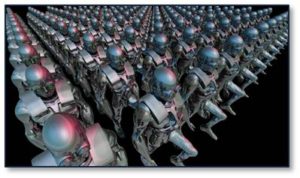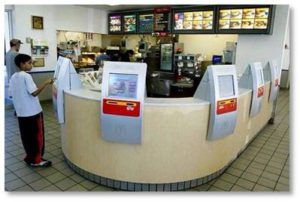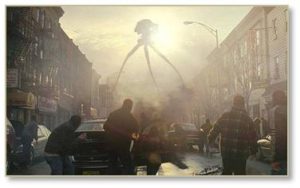In all the discussions, announcements, pronouncements, warnings and analyses of the coming robot revolution, one question has begun to pop up: what’s the difference between a robot, a kiosk and an appliance? Is there a difference? Should we care?
Well, I think one reason we get our undies in a bundle about robots is that we see this army of mechanical men marching to work, standing on production lines and standing behind counters. Somehow that image strikes me as more threatening than the other guises that robots can take. I break these form factors down into three categories: appliances, kiosks and robots.
Does the physical form of a mechanical device make a difference to our human perceptions? Does one form factor frighten us while another is acceptable? I think so, because our culture and lifestyle have taught us to accept certain things while we still find others strange. And strange = other = scary = bad. Let’s take the categories one at a time and see what they look like.
Appliances
Most of us would define an appliance as a device that sits on a counter and performs a specific, limited function. Whether it’s in the kitchen (toasters, food processors, coffee machines, etc.) or in the computer center (servers, switches, etc.) these boxes do exactly what we tell them to do when we flip the switch and no more. So why is a Sushibot called a robot because it makes sushi when a Zojirushi is just an appliance that bakes bread? In terms of function, they are the same. Each of them does the work that humans did and still do. Did Suzumo call the Sushibot a robot just because it was cool and trendy?
Appliances are not scary because they do grunt work that takes time and sometimes muscle. They relieve us of these burdens so we can do other things. We humans are not afraid of our coffee makers, nor would we think to call them robots even though they perform basically the same function as a barista but without the fancy foam swirls and misspelled names on cups.
Ironically, the humans of Battlestar Galactica 2 called the Cylons “toasters” as a pejorative term. They intended this to demean the big chrome Centurions but also to remind themselves that even the Cylons with a human form factor were just machines.
Kiosks
These devices have been with us for a while, also and they are simply transactional robots. ATMs have made getting cash simple and we accepted them long ago for the sheer convenience. No longer did we need to get to the bank in time to cash a check or get money from an account. Banks, of course, have never been too popular so no one worried that ATMs might put bank employees out of work. Who cared, when we could get our money any time we wanted?
More recently we have seen the rise of kiosks, which are freestanding transactional robots. Kiosks have taken over airline terminals, delivering similar speed and flexibility to harried passengers.
No one getting movie tickets from the Fandango kiosk in the theater lobby would call it a robot even though we may have noticed that fewer humans now stand at the ticket counter.
Fast-food companies have begun introducing ordering kiosks in their restaurants and I suspect that we will accept them quite smoothly and without a second thought for all those missing employees behind the counter. After all, they are just ATMs that dispense hamburgers instead of money. How you feel about retail checkout kiosks is up to you. I have made my opinion clear.
Robots
That leaves robots, which I will define as autonomous, mobile and intelligent. Here we enter the realm of the futuristic and often threatening. After all, our first introduction to robots came through the movies and TV shows of the fifties and sixties. At the start of the Cold War, movies reflected American fears of a takeover by Others. Most science fiction movies and TV programs seemed to include a robot.
Some were friendly—just another member of the cast—while others scared us sleepless. Remember the huge, deadly killing machines of War of the Worlds (either version)? Even Gort, the humanoid robot controlled by Michael Rennie as Klaatu in The Day the Earth Stood Still was kind of a scary aluminum dude. He had a death ray in his cyclopean eye slit, after all. Even the Tin Man in Oz didn’t have a heart.
The frightening robots reached their apotheosis in the Terminator franchise as all the robots, computers, networks and data bases combined into the murderous Skynet. Captain Adama had a good reason for refusing to network Galactica to the rest of the fleet.
The Greater Fear
The greater fear now focuses less on surviving death rays than surviving life after a robot gets your job and you get a pink slip. Entrepreneurs, news reporters and pundits try to assuage those fears by reassuring us that more jobs will be created as new technologies emerge. This comes as cold comfort to older employees who know they will never find another job that offers (A) a career track, (B) the same salary as the previous position and/or (C) a modicum of self-respect.
The larger questions are how soon will the robot revolution will sweep across industries and how many people will be affected. Much remains to be seen.





As I’ve said before, robots have been coming for decades, and to add to this, I don’t see this as “robotic centric” as I believe you or even maybe David do. The issue is more around automation, which is largely driven by the “better, faster, cheaper” manifesto of an open market society as we have in the U.S still today. When AT&T operators lost their jobs (tens of thousands of them) to automation, did you care? When vacuum tubes for TV’s and radios became obsolete, and dozens of factories closed, or went of business, laying off thousands, did you care? I didn’t much. How about with light bulbs going to LED’s? I truly believe what you’re really talking about is more about the consequences of continued technological evolution and innovation. Aline, that’s what we do, that’s what we’re known for in the U.S., no? What I’d like to see more about, is how we could be more compassionate about those negatively impacted by it, and how we could provide more training (“re-skilling”?), and education to address this more often and more directly. Hell, there are something like 10,000 of us old fossils retiring every day today – we need educated people to help fill in these gaps don’t we?
Okay Mike here’s the difference between what David and I are saying and the examples you gave. Those innovations were designed to improve products or processes. They were designed to make people more productive or efficient. They were designed to entertain, educate, or empower human beings. These robots are designed to replace human beings. That’s their function. Yes, jobs were lost to previous innovations but they were collateral damage as it were. The workers who are about to go on the unemployment rolls have been targeted. Business wants them gone and wants to put robots in their place because robots are cheaper. Do you see the difference?
My wife asked me why I was wearing a handgun in the kitchen. I replied “The Decepticons.” She laughed, I laughed, the toaster laughed. I shot the toaster.
🙂
Was the toaster a Cylon Centurion? That would be scary.
I just found this article that I think has some bearing here to explain my viewpoints on your important topic:
http://money.cnn.com/video/news/economy/2016/09/01/technology-replacing-jobs-working-nation.cnnmoney/index.html?iid=hp-stack-dom
Let me know what you think.
What this story says, Mike, is that 70 million jobs are at risk in the coming years and they are not limited to low-level jobs. The surgeons, anesthetists, chefs and others included in the story would argue that they are educated, trained, skilled, experienced, and determined yet they could be replaced by robots. Yes, I found jobs after being laid off but I finally retired (or got retired) after the last one when the economy was still bad and few jobs were open. I just said “stick a fork in me, I’m done.”
The man who checks receipts at the BJs I go to spent 14 years working at TJ Maxx but was dumped when he hit 55. Is he working? Yes. Is he making the same money with the same benefits? No. Does he have the same job satisfaction? Not in the least. The question is what happens when the economy slows down because not enough people are gainfully employed to support consumer businesses and what the government will do when 70 million people fall off the tax rolls because they’re either unemployed or underemployed.
So here’s the crux of this in my view: You, me and David have all been summarily dispensed with more than once in our careers I would guess, and it wasn’t fun. For me, I dusted myself, analyzed the job landscape, and targeted opportunities I felt best suited to re-inject myself next as I suspect you both did. Sure, I had a pretty good education, but I also had a modicum of resilience, determination, savvy, moxie and most importantly the ability to adapt, with an open mind to learning something new. Some folks never learned or know about these things, don’t care, or have no interest in doing so, and that’s to their detriment. Adaptation is key to our survival, especially in the work place and because of this one thing (coupled with the ability and interest to learn something new), I have never had to take a lesser job or a job at lower pay. How about you? And you will note that this very interesting discussion has almost nothing to do with robotics!
That’s a whole different post, Mike.
I loved everything you wrote save the last two paragraphs. First, us older employees have been displaced numerous times, for all kinds of reasons. And you and I both managed to find other jobs, offering a career track with similar or better salaries when we were dispensed with over time. Some of us couldn’t, depending on all kinds of reasons, to numerous to mention here. Second, I have yet to see a case where an educated and/or determined older worker was ever replaced by a robot. I realize the fear is certainly there, but there aren’t a lot of instances of it happening from what I’ve read or seen. Have you?
What has happened is not necessarily what will happen. A Chinese publication used an AI robot to produce its news coverage of the Rio Olympic games. And a couple of entrepreneurial twerps (en-twerp-prenarials?) were interviewed on 60 Minutes about their new AI-based financial software and they admitted it would put a significant number of financial services employees out of work. Asked how they felt about that, they simply said that new jobs would somehow appear to employ them. How? Who knows? Airline ticket counter agents might assert they were educated and determined but they were replaced by robots. Keep your eyes open, Mike. More robots are being introduced every week and there is no rule that prevents them from taking the jobs of educated and determined workers of any age.
Agreed that there’s no rule, but there’s also a low likelihood of this scenario actually happening anytime soon. Certainly not in my remaining career years or even probably my lifetime. There’s a couple of reasons why I say this:
1. Efficacy – the ability of any given robot platform to produce the desired or intended result that you describe.
2. Economic Viability – to create a robot at the performance and capability level that you suggest would cost a lot, even if practical to develop, market and sell.
3. Market Value – I don’t think anybody would care or even bother to make a robot to replace me anytime soon anyway!